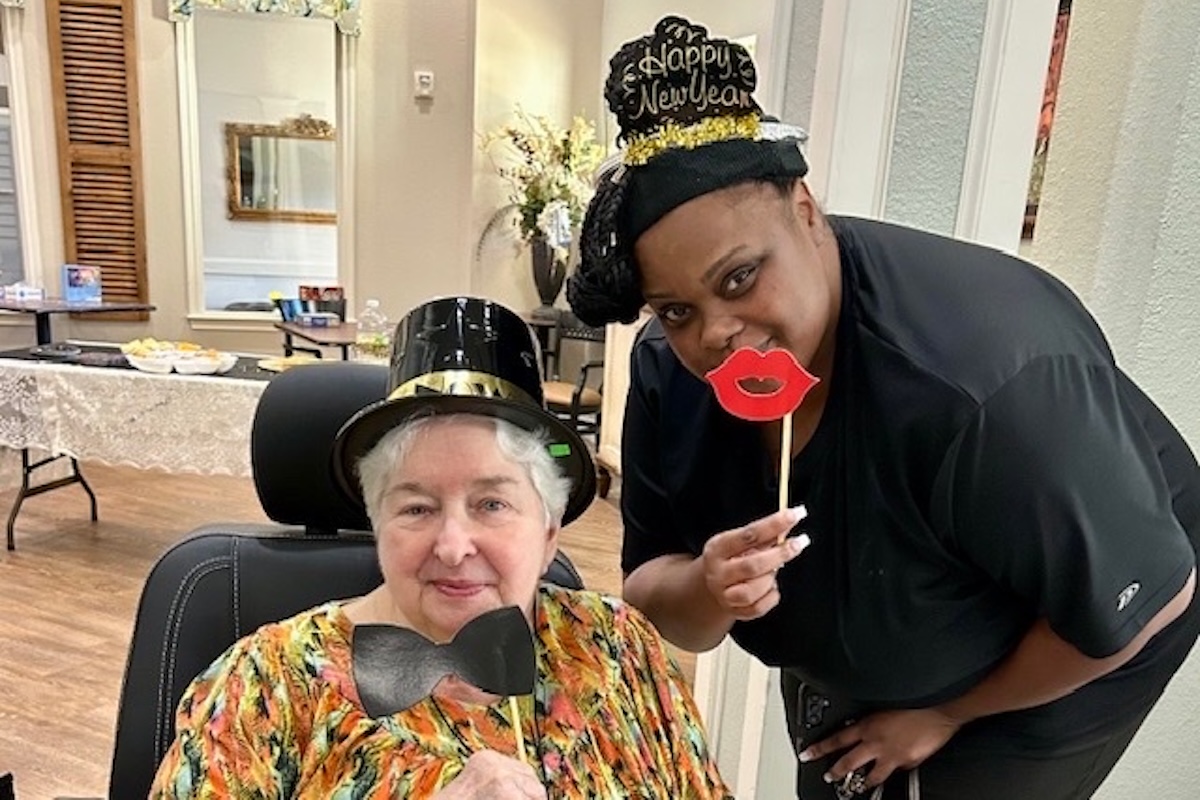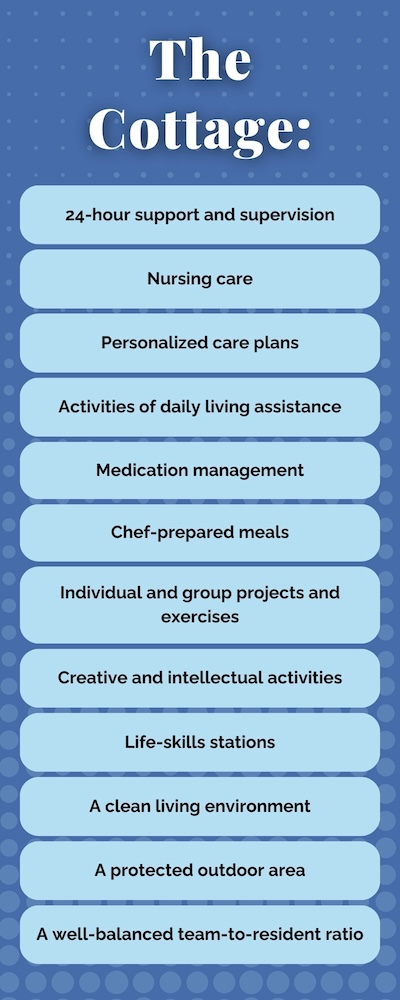Columbia University researchers report that close to 10% of U.S. adults ages 65 and up have dementia; 22% live with mild cognitive impairment. We don’t expect that trend to change anytime soon, underscoring the need for quality memory care communities.
Dementia research is ongoing, and we’ve learned a great deal about various types of dementia, stages of dementia, and treatment. Seniors with Alzheimer’s and other forms of cognitive impairment benefit from targeted treatments and holistic approaches; the field is constantly improving, and we focus on staying ahead of the curve.

Arabella of Longview is a full-service memory care community for older adults in Longview, TX. We offer independent living, assisted living, and memory care. When families contact us, we educate them about dementia, explaining the types, stages, and how we support our memory care residents.
Dementia is an Umbrella Term
Dementia is a wide range of conditions affecting brain function and judgment. It’s a common misconception that dementia is a condition in itself. In reality, it’s a collection of symptoms caused by certain underlying conditions. Although people use the words Alzheimer’s and dementia interchangeably, their meanings are different.
Dementia, whether early-onset (developing before age 65) or late-onset (developing after age 65), can arise from a range of underlying conditions, including:
- People with Alzheimer’s having plaques (clumps of the beta-amyloid protein) and tangles in their brains
- Huntington’s
- Parkinson’s
- Damage to the vessels that supply blood to the brain
- Breakdown of nerve cells
- Traumatic brain injuries
- Other rare conditions
These conditions damage cells in various areas of the brain and affect how it works, leading to memory loss and other cognitive and behavioral issues.
Types of Dementia Symptoms
As the most common type of dementia, Alzheimer’s affects over six million Americans. While the specific symptoms of that condition and other kinds of dementia vary depending on the underlying cause, the main symptoms include:
- Memory loss
- Difficulty with language and communication
- Impaired judgment and decision-making
- Changes in mood and behavior
If you or someone you know is experiencing memory loss or other signs of dementia, it’s best to talk to a healthcare professional. Early diagnosis and treatment can help slow subsequent stage progression and improve outcomes.
There is no known cure for most types of dementia, but specialized treatments and activities manage symptoms and improve quality of life.
What are the stages of dementia?
There are two main ways to categorize Alzheimer’s and dementia. Let’s start with the most common type of dementia.
The 7 Stages Of Alzheimer’s
Also known as The Global Deterioration Scale, the 7 Stages of Alzheimer’s covers functioning and cognitive decline for this form of dementia:
Stage 1: No Cognitive Decline
There are no symptoms of dementia or other forms of cognitive decline. Individuals exhibit typical behaviors and perform daily activities independently.
Stage 2: Very Mild Cognitive Decline
In this early stage of dementia, individuals may show mild forgetfulness. Remembering recent events or conversations may be difficult, but they retain most cognitive abilities. Minor deficits in reasoning skills may also become apparent.
Stage 3: Mild Cognitive Decline
Concentration and understanding abstract concepts become increasingly difficult during Stage Three. There are significant memory lapses, like forgetting what they ate for dinner. They may also need help with complex tasks like balancing checkbooks.
Stage 4: Moderate Cognitive Decline
In this stage, individuals need help with basic tasks like dressing themselves and may display confusion when presented with new information. Memory loss further increases, and they cannot recall recent events or personal life stories without prompts from caregivers.
Stage 5: Moderately Severe Cognitive Decline
Stage five is considered middle-stage dementia. It represents a substantial decrease in functioning, and individuals often require assistance with self-care, such as bathing, eating, and grooming. Many display intense confusion when confronted with new stimuli. Memory loss worsens significantly during this stage, and communication becomes increasingly difficult.
Stage 6: Severe Alzheimer’s
In the sixth stage of Alzheimer’s, memory becomes increasingly impaired, making it impossible for the individual to recognize family or recall personal information. Symptoms increase rapidly:
- Hallucinations
- Anxiety and frustration
- Mobility loss
- Severe personality changes
Stage 7: Late Stage
People in the last stage of dementia find it difficult to participate in basic daily activities in any capacity—all tasks require round-the-clock assistance. They are increasingly vulnerable to pneumonia, other infections, and the possibility of eventual hospice care.
Arabella of Longview provides much-needed assistance for those with severe memory loss when loved ones require full-time, 24-hour care.
The FAST Scale for Dementia
Developed by Dr. Barry Reisberg, the FAST scale assesses the degree of cognitive impairment in people with dementia. It also divides dementia into seven stages, from normal functional ability to severe cognitive decline.
FAST assesses one’s level of functioning and capability to perform activities of daily living (ADLs). It focuses more on that than stages of cognitive decline. The assessment offers a standardized method of evaluating functional decline so healthcare professionals and caregivers can anticipate needs and provide appropriate support.
Each stage evaluates:
- Ability to perform everyday tasks
- Activities of daily living
- Language skills
- Memory and memory loss
- Mobility levels
- Social behavior
Your loved one’s medical provider can advise you about these tests and provide a staging and diagnosis. If 24-hour care is needed, Arabella of Longview is here to support your family.
We Serve Residents With Different Types of Dementia
At Arabella of Longview, our trained professionals provide individualized care plans tailored to meet physical and emotional needs in a protected environment where residents can feel a sense of community. Ultimately, we want to help family members and their loved ones find deeper meaning and purpose.
The Cottage is our dementia-friendly environment that offers:

“They really pamper and make my mom feel special. I truly sleep better at night knowing the quality care she is getting.”
– Family Member of Resident
We warmly welcome family visits to Arabella of Longview. Our passionate team members will handle the care while you cherish all the small but meaningful moments. Passion Is Our Purpose: Our residents and loved ones know we provide long-term care that feels like home.
Contact Us for Comforting Dementia Care in Longview, Texas
The Cottage at Arabella of Longview offers memory care for various forms of dementia. You don’t have to take this journey alone; explore comprehensive options for senior care by contacting us.




